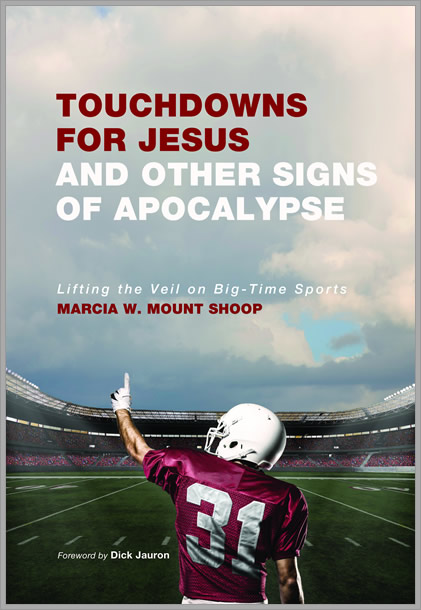Touchdowns for Jesus and Domestic Violence in Big-Time Sports
Read Marcia Mount Shoop’s response to this review here.
If, as Calvin famously said, Scripture is the lens through which we see the world, then we’re each wearing a unique pair of frames. In her book Touchdowns for Jesus and Other Signs of Apocalypse: Lifting the Veil on Big-Time Sports, Marcia W. Mount Shoop has on a particularly distinctive pair. She introduces herself as an athlete, a Presbyterian minister, a feminist, a mother, and the wife of a big-time football coach. Mount Shoop’s husband, John Shoop, has coached numerous NFL teams, the University of North Carolina (UNC) football team, and currently coaches at Purdue. This book has grown out of the years of experience she and her husband have shared living and working within the football community.
As I sat down to read Mount Shoop’s book, I of course had to acknowledge the distinctiveness of my own frames and the way that influenced my reading. I was born in Kentucky (Go Cats!) and grew up in State College, PA (WE ARE!!). Sports have been part of my life for as long as I can remember; I don’t understand what it means to not have teams. My dad played softball in rural Kentucky, my brothers played years and years of baseball, and my whole family has always been known watch more than our fair share of basketball and football games on TV.
___________________________________________
My love for sports often clashes with the priorities and convictions that drive the rest of my life.
___________________________________________
All that is to say that I am an avid sports a fan. I am also a feminist, a seminary graduate, a sociology major, and a former sexual assault and domestic violence counselor. My love for sports often clashes with the priorities and convictions that drive the rest of my life. Books like Mount Shoop’s Touchdowns for Jesus remind me of something I’ve always known: I’m not alone when it comes to this tension between my passion for sports and my passion for justice.
 I came to Mount Shoop’s book with a great deal of excitement. The blurb on the book promises that Mount Shoop will discuss “fanaticism, sexism, racism, and abuse of power” – and she undoubtedly does. However her location so deeply within the sports world lends itself to a certain viewpoint that left me, and perhaps other readers who are ‘outsiders’, wanting more.
I came to Mount Shoop’s book with a great deal of excitement. The blurb on the book promises that Mount Shoop will discuss “fanaticism, sexism, racism, and abuse of power” – and she undoubtedly does. However her location so deeply within the sports world lends itself to a certain viewpoint that left me, and perhaps other readers who are ‘outsiders’, wanting more.
The title of the book, Touchdowns for Jesus and Other Signs of the Apocalypse, immediately took my mind (and I imagine the minds of many readers) to the Sports Illustrated feature I have read for years: “This Week’s Signs of the Apocalypse” in which we read tongue-in-cheek “evidence in the sports world that humanity has hit a new low and the end must be near.” [1] Mount Shoop acknowledges the how her title echoes this feature, but ultimately, she wants her readers to understand the word ‘apocalypse’ in a more theological way. In her words: “Apocalypse is not the end; it is an unveiling of the truth – the truth about the world as it is now. Apocalypse reveals the things wrong with the world along with what good is possible and what is right.” [2] From that starting place, Mount Shoop takes a look at the world of sports in order to find out what that system can tell us about ourselves, our society, and the other ‘worlds’ of which we’re part.
Mount Shoop does a wonderful job pointing to the ways in which the sports ‘system’ functions that disadvantage the players. She looks primarily at the Division 1 football system, but readers can easily see how this systems functions in virtually the same way for other big-time sports, both at the professional and college levels. The issues of big-time sports that she delves into are all over the map: the institutional racism, the stereotypical gender norms including a harmfully narrow view of masculinity, the ways that those who hold power over student athletes wield their religion, the question of what being a student athlete means in different places…the list goes on. All of these issues are rife with the need for dialogue, and Mount Shoop addresses them in a way that invites all voices to the table and into the conversation.
___________________________________________
Mount Shoop does a wonderful job pointing to the ways in which the sports ‘system’ functions that disadvantage the players.
___________________________________________
One experience/situation with reverberations that are felt throughout Mount Shoop’s book is the investigation of the UNC football team for a cheating scandal during the time that the Shoop family lived in Chapel Hill, NC. Mount Shoop’s husband John was on the UNC coaching staff at the time, and the experiences of the players, the team, and their interactions with the NCAA are painful to read. As any fan of college sports is aware, especially a fan whose team has had its own run in with the NCAA, it’s an incredibly imperfect system. The points that Mount Shoop makes about the NCAA, the power difference and racial differences between people in power and players, the problems with gender norms, or the ways in which Christianity can be imposed on players are all compelling and insightful. But I think it’s only part of the story.
Personally, as someone who grew up in a town characterized by what Mount Shoop calls “Big-Time” sports, there is another crucial issue on which she is strangely silent. I have a distinct memory from an after-school program that I attended at my church during middle school. Our teacher was a female college student at a school that, at the time, had a pretty fantastic football team that had been very successful in the last few years. She told us she had actually met the quarterback in a bar and had danced with him. We all thought that was pretty amazing; he was cute, and we were teenagers. We asked her what he was like, and she responded, “Well, he was a jerk.”
Of course, we prodded her to tell us more, and she eventually explained the pick-up line he tried to use on her, something along the lines of, “Hi, I’m so and so, let’s go back to my place” (only with much more vulgar language). While the line didn’t work on our teacher, she told us how she watched it have its intended effect with another woman that night, and one could only assume that it worked with many women during this man’s time at PSU. After years of playing football, winning, and being rewarded, he had cultivated this attitude of entitlement. He believed that it was ok to treat a woman with no respect because once she knew who he was, she would clearly want to jump in his bed.
___________________________________________
After years of playing football, winning, and being rewarded, he had cultivated this attitude of entitlement.
___________________________________________
There are other stories, of course, about judges excusing sexual assault because the alleged perpetrator played on a college sports team and was a “nice guy” who just had a drinking problem. Or about someone found guilty but sentenced only to community service because the judge “had to do something.” While Mount Shoop rightly points to abuses of power in the player-coach or owner-coach relationship, to me it’s irresponsible to not mention the consequences that this sense of entitlement and power – or perhaps even the illusion of power – has for the ways that players learn to interact with the other people in their lives, especially women.
 The NFL contends that their arrest rate is actually lower than that of the rest of the general population, though the sexual assault/domestic violence counselor in me wonders if there is some element of under-reporting at work. Mount Shoop rightly points out the power differential between players and coaches, but there is also a cultural power differential between sports “stars” and the general population. And if there is one thing my work in domestic violence and sexual assault taught me, it’s that crimes committed, crimes reported, crimes prosecuted, and convictions of guilty parties are all very, very different things.
The NFL contends that their arrest rate is actually lower than that of the rest of the general population, though the sexual assault/domestic violence counselor in me wonders if there is some element of under-reporting at work. Mount Shoop rightly points out the power differential between players and coaches, but there is also a cultural power differential between sports “stars” and the general population. And if there is one thing my work in domestic violence and sexual assault taught me, it’s that crimes committed, crimes reported, crimes prosecuted, and convictions of guilty parties are all very, very different things.
Mount Shoop has written a great book that invites both church and culture into the conversation about an abundance of important issues. I only wish she had pushed it a bit farther.
____________________________________________
[1] Mount Shoop, 8.
[2] Mount Shoop, 9.
AUTHOR BIO: Rachel Mastin is the Pastoral Assistant for Christian Education and Youth at Bon Air Presbyterian Church in Richmond, VA. When she’s not at work, she loves reading about pop culture, looking for God on her everyday walks, and thinking about ways to encourage community.
Read Marcia Mount Shoop’s Response to this review here.
Read more articles from this issue, “Hearing the Voices of Peoples Long Silenced”: Gender Justice 2014!











Pingback: Sunday Reads: 12/14/14 | Jason C. Stanley
Pingback: Marcia Mount Shoop Navigates the Complexities of Sports Controversy and Theological Dilemma / Press Releases